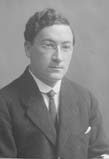Ficker, Ludwig von (Mentor)
(4/13/1880, Munich - 3/20/1967, Innsbruck)
The son of a professor of historical jurisprudence and a teacher from South Tyrol, he moved to Innsbruck in 1896. Studied law based on paternal desire, then art history and German in college. In 1900 his play “Children of Sin” was produced at the Innsbrucker city theater. A “Fervor of the Storm; a Round of Verses” appeared in 1904 in Leipzig.
A large inheritance permitted him a fancy lifestyle and extended stays in Italy while he tried to establish himself as an independent writer. In 1908 he married the Swede Cäcilie Molander. In 1910, Ficker began publication of the bi-monthly magazine Der Brenner, which received recognition as a forum for cultural criticism and avant-garde literature in the whole German language area. Frequent contributions were received from Theodor Däubler, Albert Ehrenstein, Else Lasker-Schüler, Hermann Broch, Rainer Maria Rilke, Theodor Haecker and Ferdinand Ebner, as well as coworkers Carl Dallago, Karl Röck, Karl Borromäus Heinrich and Max von Esterle. In 1912, he organized the first public reading of Karl Kraus in Innsbruck who had formally shaped the satires and political commentary in Der Brenner. Kraus wrote a statement on the Brenner in his magazine Die Fackel ( The Torch). ![]()
In 1914 he received a generous donation from Ludwig Wittgenstein of 100,000 crowns to distribute to needy artists, which he passed on to Rilke, Adolf Loos, Trakl and others.
In May 1912, Der Brenner helped Trakl break through as an artist by printing his poem The Suburbs in Foehn ![]() . Ficker described his first meeting with Trakl at the Café Maximilian on May 22, 1912.
. Ficker described his first meeting with Trakl at the Café Maximilian on May 22, 1912. ![]()
Beginning with "Psalm", dedicated to Karl Kraus, in October of the same year, approximately 60 additional Trakl poems were published, and helped pave the way for book publications with the Kurt Wolff publishing house. More important was the human refuge Trakl found at Ficker's estate, his family and the circle of “Brenner” coworkers. He frequently visited there before the outbreak of war in Innsbruck. Besides “The Young Maid”, Georg also dedicated “Song of a Captured Blackbird” to Ficker, which he developed on a short trip to the Gardasee in the spring 1914. Ficker was the last person to visit Trakl before his death in the Krakow Military Garrison Hospital, from which his last letters were address.
After WWI, Ficker lost the material basis of his existence and transferred Der Brenner to the publishing arm of a university. With the disassociation from Kraus, his literary satire and contemporary criticism gave way to philosophical and theological essays, and lyric poetry, representing a radical Christian
inwardness. Likewise, the care of Trakl's legacy became a primary focus, which, however, required clarification, religious stylizations and implied the establishment of a Trakl sect. In 1925, Ficker transferred Trakl's remains from Krakow to Innsbruck-Mühlau.
In 1940, the Reichsschrifttumskammer (Censorship Office) in Nazi occupied Austria classified Der Brenner among the “harmful and unwanted magazines.” Ficker maintained his contacts in the resistance circles. In 1946 after a twelve-year break he published a new sequence of Der Brenner with poems from Trakl, Kraus, Gertrude von Le Fort, and Paula Schlier. The last sequence in 1954 was dedicated to the memories of Ebner, Dallago, Trakl, Wittgenstein and Rilke. In 1959, he receive the coveted Austrian State Order of Merit, and in 1964 with his friend Ignaz Zangerle founded the “Brenner Archives (since 1979 “The Brenner Archives Research Institute.”) After his death in 1967, he was buried beside Trakl.
